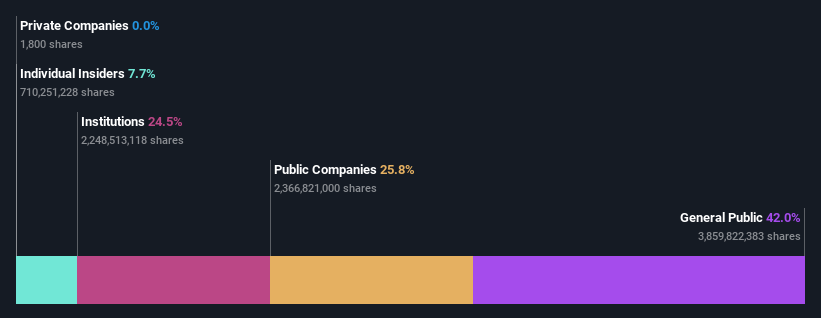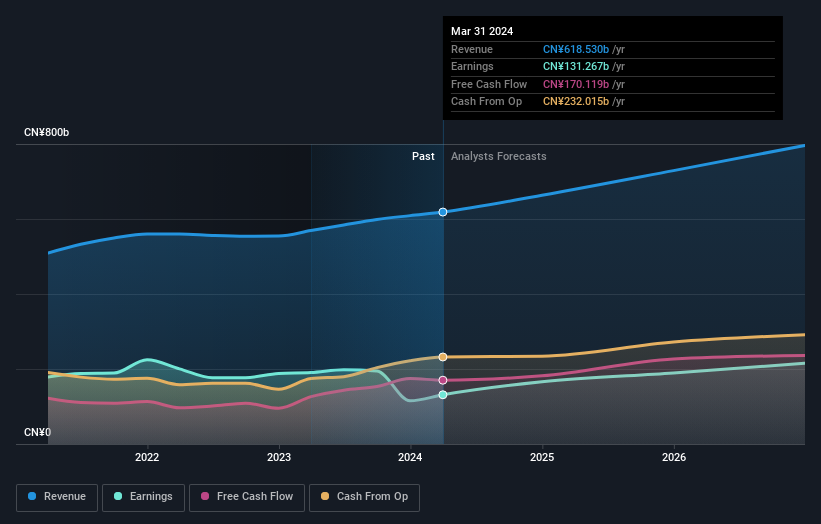- Hong Kong
- /
- Interactive Media and Services
- /
- SEHK:700
Tencent Holdings Limited's (HKG:700) largest shareholders are individual investors with 42% ownership, public companies own 26%
Key Insights
- Tencent Holdings' significant individual investors ownership suggests that the key decisions are influenced by shareholders from the larger public
- A total of 25 investors have a majority stake in the company with 49% ownership
- Insiders have been selling lately
If you want to know who really controls Tencent Holdings Limited (HKG:700), then you'll have to look at the makeup of its share registry. With 42% stake, individual investors possess the maximum shares in the company. Put another way, the group faces the maximum upside potential (or downside risk).
And public companies on the other hand have a 26% ownership in the company.
Let's take a closer look to see what the different types of shareholders can tell us about Tencent Holdings.
See our latest analysis for Tencent Holdings

What Does The Institutional Ownership Tell Us About Tencent Holdings?
Many institutions measure their performance against an index that approximates the local market. So they usually pay more attention to companies that are included in major indices.
Tencent Holdings already has institutions on the share registry. Indeed, they own a respectable stake in the company. This implies the analysts working for those institutions have looked at the stock and they like it. But just like anyone else, they could be wrong. It is not uncommon to see a big share price drop if two large institutional investors try to sell out of a stock at the same time. So it is worth checking the past earnings trajectory of Tencent Holdings, (below). Of course, keep in mind that there are other factors to consider, too.

Tencent Holdings is not owned by hedge funds. Naspers Limited is currently the company's largest shareholder with 26% of shares outstanding. In comparison, the second and third largest shareholders hold about 7.7% and 2.7% of the stock. Huateng Ma, who is the second-largest shareholder, also happens to hold the title of Chief Executive Officer.
On studying our ownership data, we found that 25 of the top shareholders collectively own less than 50% of the share register, implying that no single individual has a majority interest.
While it makes sense to study institutional ownership data for a company, it also makes sense to study analyst sentiments to know which way the wind is blowing. Quite a few analysts cover the stock, so you could look into forecast growth quite easily.
Insider Ownership Of Tencent Holdings
The definition of an insider can differ slightly between different countries, but members of the board of directors always count. Company management run the business, but the CEO will answer to the board, even if he or she is a member of it.
Insider ownership is positive when it signals leadership are thinking like the true owners of the company. However, high insider ownership can also give immense power to a small group within the company. This can be negative in some circumstances.
We can report that insiders do own shares in Tencent Holdings Limited. Insiders own HK$262b worth of shares (at current prices). we sometimes take an interest in whether they have been buying or selling.
General Public Ownership
The general public, who are usually individual investors, hold a 42% stake in Tencent Holdings. While this size of ownership may not be enough to sway a policy decision in their favour, they can still make a collective impact on company policies.
Public Company Ownership
We can see that public companies hold 26% of the Tencent Holdings shares on issue. This may be a strategic interest and the two companies may have related business interests. It could be that they have de-merged. This holding is probably worth investigating further.
Next Steps:
I find it very interesting to look at who exactly owns a company. But to truly gain insight, we need to consider other information, too. Consider for instance, the ever-present spectre of investment risk. We've identified 1 warning sign with Tencent Holdings , and understanding them should be part of your investment process.
If you would prefer discover what analysts are predicting in terms of future growth, do not miss this free report on analyst forecasts.
NB: Figures in this article are calculated using data from the last twelve months, which refer to the 12-month period ending on the last date of the month the financial statement is dated. This may not be consistent with full year annual report figures.
Valuation is complex, but we're here to simplify it.
Discover if Tencent Holdings might be undervalued or overvalued with our detailed analysis, featuring fair value estimates, potential risks, dividends, insider trades, and its financial condition.
Access Free AnalysisHave feedback on this article? Concerned about the content? Get in touch with us directly. Alternatively, email editorial-team (at) simplywallst.com.
This article by Simply Wall St is general in nature. We provide commentary based on historical data and analyst forecasts only using an unbiased methodology and our articles are not intended to be financial advice. It does not constitute a recommendation to buy or sell any stock, and does not take account of your objectives, or your financial situation. We aim to bring you long-term focused analysis driven by fundamental data. Note that our analysis may not factor in the latest price-sensitive company announcements or qualitative material. Simply Wall St has no position in any stocks mentioned.
About SEHK:700
Tencent Holdings
An investment holding company, provides value-added services, marketing services, fintech, and business services in Mainland China and internationally.
Flawless balance sheet with solid track record.
Similar Companies
Market Insights
Community Narratives



